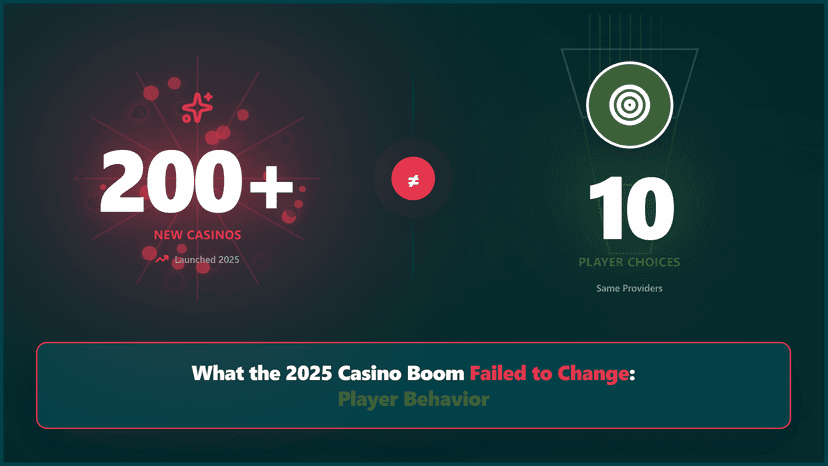Gambling Addiction
Gambling addiction, also recognized as compulsive gambling or gambling disorder, is the uncontrollable urge to keep gambling despite the toll it takes on one's life. Gambling can stimulate the brain's reward system much like drugs or alcohol can, leading to addiction. At CasinoRank, we advocate for responsible gambling and provide this guide to help understand and address gambling addiction effectively.
Understanding Gambling Addiction
Online gambling addiction is just like any other form of addiction. It’s a compulsive behavior where you continuously seek out and engage in gambling activities, despite the negative consequences. These could be financial, emotional, or even physical. The digital age has made gambling more accessible than ever before, and with that comes the increased risk of addiction.
Why Do People Get Addicted to Gambling?
- Instant Gratification: Quick results create a rush—wins feel rewarding, and losses drive the urge to chase them.
- Easy Access: Online gambling is available 24/7 on any device, making frequent play hard to resist.
- Privacy: It’s discreet, allowing people to gamble without others knowing, reducing accountability.
- Enticing Bonuses: Promotions and rewards can encourage players to bet more than intended.
- Escape: Gambling offers a temporary break from stress or boredom, but repeated use for escapism can become a habit.
- Social Hooks: Multiplayer games, leaderboards, and chat features add social motivation to keep playing.
- Illusion of Control: Strategy-based games may trick players into thinking skill ensures winning, fueling continued play.
Recognizing the Signs of Gambling Addiction
Recognizing an addiction early on is crucial for prevention and intervention. Understanding the signs of online gambling addiction can help you or someone you know take corrective actions before it spirals out of control. These signs can be classified into two categories: personal and external.
1. Personal Signs
One of the most proactive ways to prevent addiction is by self-monitoring. Pay attention to these personal signs, which could indicate a growing problem:
Preoccupation:
This isn't just the occasional thought; this is when your mind constantly drifts to gambling. You might find yourself daydreaming about the next time you'll play or strategizing your next bet even when you’re engaged in other activities. If gambling becomes a frequent topic of your daydreams or conversations, this could be an early warning.
Increasing Bets:
It starts subtly. First, you're just adding a few more dollars than you usually would. Over time, you might notice that you’re not as satisfied with small bets. You feel the need to bet more money and do it more frequently to experience the same thrill. This escalation in bet amounts can be a slippery slope to financial challenges.
Chasing Losses:
Nobody likes to lose. But if after a loss, you find yourself thinking, "I can win it back," be cautious. Continually trying to "win back" what you've lost often leads to bigger losses and a feeling of being trapped in a cycle.
Gambling with Savings/Budgets
The transition from recreational betting to gambling with savings marks a dangerous shift in online casino play. When players start dipping into funds reserved for essential needs or savings, it becomes a clear sign of addiction. This behavior is particularly risky at new online casino sites, where the variety of games and the allure of potential wins can be overwhelming. Players may convince themselves that using money intended for necessities like rent, food, or healthcare to place bets is justified by the chance of winning big. However, this is often a gamble against their financial security and well-being.
Withdrawal Symptoms:
If you try to reduce your gambling or take a break and find yourself feeling restless, irritable, or even anxious, these could be withdrawal symptoms. Much like other addictions, your body may react negatively when it's not getting its usual dose of the activity.
Neglecting Responsibilities:
When gambling starts taking precedence over essential responsibilities, it's a clear sign of an issue. Whether it's choosing to gamble over attending to work, neglecting family events, or ignoring personal obligations, these choices indicate a growing dependency.
Hiding the Act:
The need to conceal gambling, especially in new online casino environments, signals a red flag. This behavior often stems from the fear of judgment or concern over others noticing the frequency or scale of their bets. When the excitement of sharing is replaced by secrecy, it indicates a deeper issue. This change in behavior could be due to accumulating losses, spending more time or money than one can afford, or simply feeling guilty about gambling. It's essential at this point to pause and reflect.
Betting on Strange Events
Betting on various events is a common practice among online gamblers, especially with the expansive options available at new casinos. From classic casino games to live sports events, the range is vast and often enticing. However, a warning sign of potential addiction is when players start betting on events they have little to no knowledge about. This behavior reflects a shift from calculated, informed betting to impulsive, random wagering. If you find yourself placing bets on every available event, regardless of your understanding or interest, it's time to reassess your gambling habits.
2. External Signs
Sometimes we're the last to notice changes in ourselves. It's the people around us – family, friends, or colleagues – who spot these external signs:
Financial Struggles:
Unexplained loans, dwindling savings, or regular money problems are major red flags. If you find yourself borrowing money to gamble or are unclear about where your money went, it's time to reassess.
Mood Swings:
It's not uncommon to feel a rush when you win or disappointment when you lose. But if these feelings intensify and you become increasingly irritable, agitated, or even depressed, especially when not gambling, you need to pause and reflect.
Reduced Work Performance:
When gambling starts affecting your work, it's a sure sign that it's becoming a problem. Missing out on work, consistently coming in late, decreased productivity, or frequent breaks to gamble are all signs that gambling is taking over your professional life.
Avoiding Social Events:
Humans are inherently social creatures. If you find yourself regularly skipping gatherings, meetings, or events because they interfere with your gambling time or because you're trying to hide your gambling, it’s an indication that gambling is starting to control your social decisions.
Always remember, noticing one or two of these signs doesn't necessarily mean you or someone you know is addicted. However, these signs are indicators that you might want to evaluate your relationship with online gambling and consider seeking responsible gambling practices.
Steps to Prevent Online Gambling Addiction
Here are comprehensive steps to help keep online gambling a recreational activity rather than a problematic one:
Set Limits
Creating boundaries can provide a safety net:
- Time Limit: Define your gambling duration. Decide beforehand whether you'll engage for 30 minutes, an hour, or any specific time frame.
- Financial Limit: Always operate within your means. If you've allocated $50 for gambling, remain firm in not exceeding that amount.
- Frequency Limit: Determine how often you'll gamble. Maybe it's once a week, bi-weekly, or once a month. Stick to this schedule to prevent daily gambling habits.
- Win-Loss Limit: Set a point where you'll stop, whether it's after a certain win or a particular loss. This can prevent chasing losses or becoming overconfident after wins.
Educate Yourself
Equip yourself with knowledge:
- Read Articles: The internet is brimming with resources. Besides articles like this one, many provide insights into gambling behaviors and addiction.
- Attend Workshops: Look for workshops or seminars in your community or online. They can offer a deep dive into understanding the risks associated with gambling.
- Research Statistics: Understanding the odds and how they work can reduce the allure of games that have low chances of winning.
Use Tech to Your Advantage
Leverage the tools available:
- Self-exclusion: Use this feature to take breaks from certain gambling sites or apps.
- Alerts: Enable notifications to remind you when you've reached your set limits, whether they're time-based or financial.
- App Blockers: Consider using third-party applications that block access to gambling sites or apps during specified hours.
- Tracking Apps: Some apps allow you to monitor and review your gambling history, helping you be more aware of your habits.
Seek Support
You're not alone in this:
- Talk to Loved Ones: Open up about your experiences and set intentions. They can be a sounding board and offer encouragement.
- Professional Counseling: Don't hesitate to seek expert advice if you notice alarming patterns in your gambling behavior.
- Support Groups: Organizations like BeGambleAware or even online forums can be beneficial. Engaging with others who have faced similar challenges can offer both empathy and strategies for coping.
- Stay Accountable: Regularly review and discuss your gambling habits with a trusted friend or family member. This can offer an external perspective and motivation to maintain healthy habits.
How to Stop Gambling?
Taking control of a gambling habit can be challenging but is certainly achievable with a structured approach. Here are some step-by-step guidelines to help you stop gambling:
- Acknowledge the Issue: The first step toward recovery is admitting there's a problem.
- Avoid Temptation: Stay away from environments or websites that encourage gambling. Delete bookmarks, apps, or even consider self-exclusion tools to restrict access.
- Seek Support: Confide in trusted friends, family, or professionals. Their support can be a beacon during challenging moments.
- Engage in Alternative Activities: Replace gambling with other hobbies or activities you love. Whether it's reading, sports, or learning a new skill, ensure you have other outlets.
- Financial Discipline: Set strict limits on your finances. Consider giving temporary control of your financials to a trusted person or using apps to limit gambling expenditures.
- Join a Support Group: Groups like Gamblers Anonymous offer peer-led support, helping you connect with others who've faced similar challenges.
- Professional Counseling: Consider seeking therapeutic support to address any underlying issues and equip you with coping strategies.
- Stay Educated: Learn about the consequences of excessive gambling. The more you understand, the easier it becomes to resist.
- Regularly Reflect: Take time to think about your actions, their consequences, and the reasons you want to quit. This can serve as a continual reminder and motivation.
Recovery is Possible
Realizing that you have an addiction can be a daunting and overwhelming revelation. Throughout history, countless individuals have confronted and conquered their gambling demons, emerging stronger and more resilient. The key lies in seeking and accepting help. Building a robust support system, comprising understanding friends, empathetic family members, or experienced professionals, can make a world of difference. They can provide guidance, encouragement, and a listening ear when times get tough. Taking that first step by admitting you need assistance is brave, and it sets you on the path toward regaining control of your life.
List of Gambling Support Resources
These organizations offer a variety of services to assist individuals with gambling issues:
- BeGambleAware: Offers information to assist individuals in making informed decisions about their gambling habits.
- Gamblers Anonymous: A community where individuals share their experiences and find support.
- GambleAware: Provides resources and understanding for those looking to navigate or challenge their gambling habits.
- GamCare: A UK-based organization offering support, advice, and counseling services.
Use Self-Exclusion and Blocking Tools for Gambling
| Tool Name | Website | Description |
|---|---|---|
| GAMSTOP | https://www.gamstop.co.uk/ | A free service that lets you put controls in place to restrict your online gambling activities. |
| BetBlocker | www.betblocker.org | This tool blocks thousands of gambling websites and can be set for different periods. |
| Gamban | https://gamban.com/ | Effective at blocking access to all gambling sites and apps on your devices. |
| StayFocusd | Available as an extension on browsers like Chrome. | A browser extension that restricts the amount of time you can spend on specific websites, including gambling sites. |
Conclusion
Navigating online gambling takes careful thought and control. While the chance for big wins can be exciting, it's important to remember the risks. At CasinoRank, we encourage you to stay alert, look after your health, and keep in mind that gambling is meant for fun, not to take over your life. Keep your approach to gambling balanced and always ask for help if it starts to affect other parts of your life. Let's make sure gambling stays a safe and enjoyable activity.
FAQ
What is gambling addiction?
Online gambling addiction is a behavioral disorder where an individual can't control the urge to gamble online, even when it has negative impacts on their life.
How do I know if I have a gambling addiction?
Common signs include being preoccupied with gambling, increasing bet amounts, chasing losses, neglecting responsibilities, and experiencing mood swings when not gambling.
What are some preventive measures for online gambling addiction?
Setting time and financial limits, educating oneself, using tech tools like self-exclusion, and seeking professional counseling can all help prevent addiction.
Can I recover from gambling addiction on my own?
Yes, it's possible to recover from gambling addiction on your own by setting strict personal limits, finding new hobbies to replace gambling, and seeking support from friends and family. However, professional help, such as therapy or joining a support group like Gamblers Anonymous, can significantly increase the chances of a successful recovery.
Are there support groups for online gambling addicts?
Yes. Organizations like Gamblers Anonymous, or GambleAware offer support groups where individuals can share experiences and seek advice. See a bigger list of gambling support resources in this article.









